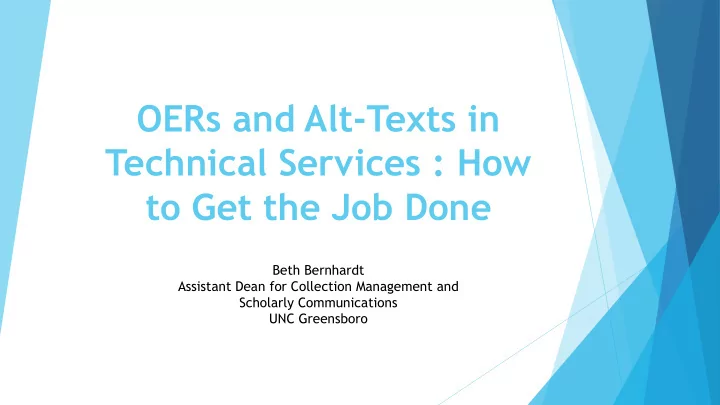

OERs and Alt-Texts in Technical Services : How to Get the Job Done Beth Bernhardt Assistant Dean for Collection Management and Scholarly Communications UNC Greensboro
What are Open Educational Resources?
Definition Teaching, learning, and research resources that reside in the public domain or have been released under an intellectual property license that permits their free use and re- purposing by others. - William and Flora Hewlett Foundation .
Open Educational Resources: The 5Rs Framework
OERS Include
Research on Cost of Textbooks UNCG Student thoughts
Why Open Education? “I stopped buying textbooks my second semester here.” - Marieme T ., library student assistant
The Reality of Student Debt The average borrower owes more than $28,950 In student loans (class of 2014) High debt loads are not only a financial stress. They can also delay the time it takes individuals or couples to reach certain milestones, such as having children, getting married or owning property. Source: Institute for College Access and Success http://projectonstudentdebt.org/files/pub/Student_Debt_and_the_Class_of_2012_NR.pdf
Student Public Interest Group report 2016 Survey of 5,000 students Nearly one third (29.7%) used financial aid to pay for their textbooks Students using loans to would pay an additional $34.72 for a $150 textbook http://studentpirgs.org/reports/sp/covering-cost
http://uncg.libguides.com/oer
Mini Grants – University Libraries 10 stipends were granted Goal was to encourage faculty to use low-cost or free alternatives to expensive course materials Open-access scholarly resources Library-licensed and owned resources Learning objects and text created by the faculty
Timeline October 2014 - Scholarly Communications Forum “Solving the Textbook Cost Crisis with Open Educational Resources” Nicole Allen from SPARC Made an announcement at the Forum and in our Campus Weekly March 2015 – OER Mini-Grants applications announced Had the Office of the Provost send out emails with the announcement April 14 th and 15 th , 2015 – Workshops held 45 faculty attended the workshops April 24 th 2015 – Applications due Had 25 applications May 11 th 2015 – Email the Grant winners Email contained contact information for the Library Liaison and the Instructional Technology Consultant
Timeline August – September 2015 – Meetings with grant winners Met with grant winners individually Late November – Early December 2015 – Report findings Meet with grant winners again Write up cost savings information Write an article with quotes from faculty February 2016 – Faculty Forum with OER winners Have the share their experiences
Cost savings Course Number of students in the class Cost of Textbook Savings CHE 342 93 $154 $ 14,322.00 CED 777B and D 8 $100 $ 800.00 POL260/240 85 $180 $ 15,300.00 ART 100 147 $175 $ 25,725.00 CED 756A 8 $412 $ 3,296.00 HDF 212 192 $211 $ 40,512.00 ATY 453 20 $80 $ 1,600.00 ARH 112 215 $171 $ 36,765.00 BUS/ENT 201 90 $80 $ 7,200.00 BUS/ENT 240 40 $70 $ 2,800.00 BUS/ENT 340 30 $60 $ 1,800.00 ENG101 - *by fall 2016 990 $65 $ 64,350.00 1918 $ 214,470.00 TOTAL
Return on Investment Average textbook cost $111.82 Cost for University Libraries and Provost Office combined (one time) $10,000.00 Gross Savings $214,470.00 Return on investment $204,470.00 ROI Ratio 21.45
Example from Dr. Bob Anemone Essential Skeleton 4 free app
Faculty thoughts on using OER in their classes “The resources I found are better than the textbook” – Jennifer Reich, Associate Director / Lecturer “I was going to use other resources for just the BUS 201 class but ended up using them for my 240 and 260 classes” – Chanelle James, Lecturer in Bryan Business School “When I told my class there would be no required textbook they all clapped and cheered!” - Heather Helms – Associate Professor, Human Development and Family Studies
Student Survey quotes I truly appreciated the resources over a traditional text book. I connected more with the resources and it was less expensive .“ I appreciated the fact that I didn't have to spend money on a textbook! The resources provided were incredible in providing relevant information. The instructor did a great job of providing the material. I think that the financial burden of textbooks is one that is sometimes unavoidable but when is can be avoided I believe it is beneficial to the student. I am very thankful for the instructor working so hard to ease the students of this burden. I believe that this method of teaching is great, and I have learned just as much as I would using a textbook.
OER nationally Open Textbook Library - http://open.umn.edu/opentextbooks/ Open Textbook Network - UNC Greensboro just joined in September http://research.cehd.umn.edu/open/join-us/ Open Library of Humanities - https://www.openlibhums.org/ OpenStax College - https://openstaxcollege.org/ Affordable Learning Georgia - http://www.affordablelearninggeorgia.org/ SPARC – List of OER Project and Policies - http://www.sparc.arl.org/resource/list-oer-projects-policies
Next Steps ECU and UNCG joint grant to provide Alt Textbooks and OER mini grants for faculty
References Bureau of Labor Statistics http://data.bls.gov/timeseries/CUUR0000SSEA011?output_view=pct_3mths The Economist http://www.economist.com/news/united-states/21612200-its-economics-101-why- textbooks-cost-so-much?fsrc=scn/fb/wl/pe/whytextbookscostsomuch Florida Virtual Campus 2012 Florida Student Textbook Survey http://www.openaccesstextbooks.org/pdf/2012_Florida_Student_Textbook_Survey.pdf NBC News http://www.nbcnews.com/feature/freshman-year/college-textbook-prices-have- risen-812-percent-1978-n399926
Questions? Beth Bernhardt Assistant Dean for Collection Management and Scholarly Communications University of North Carolina Greensboro Beth_Bernhardt@uncg.edu 336-256-1210
Recommend
More recommend